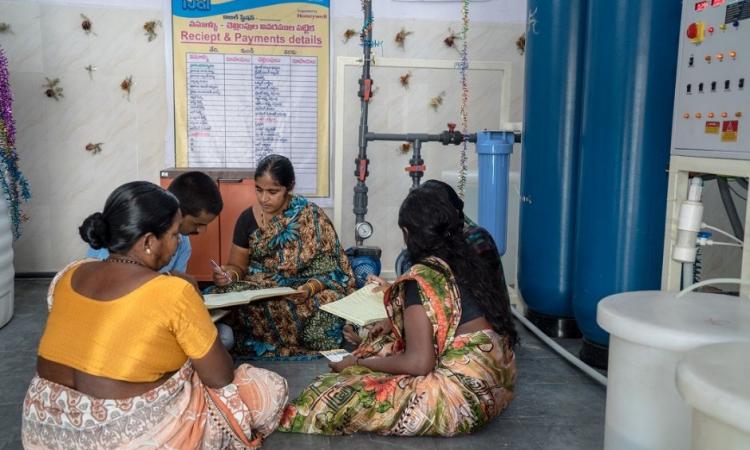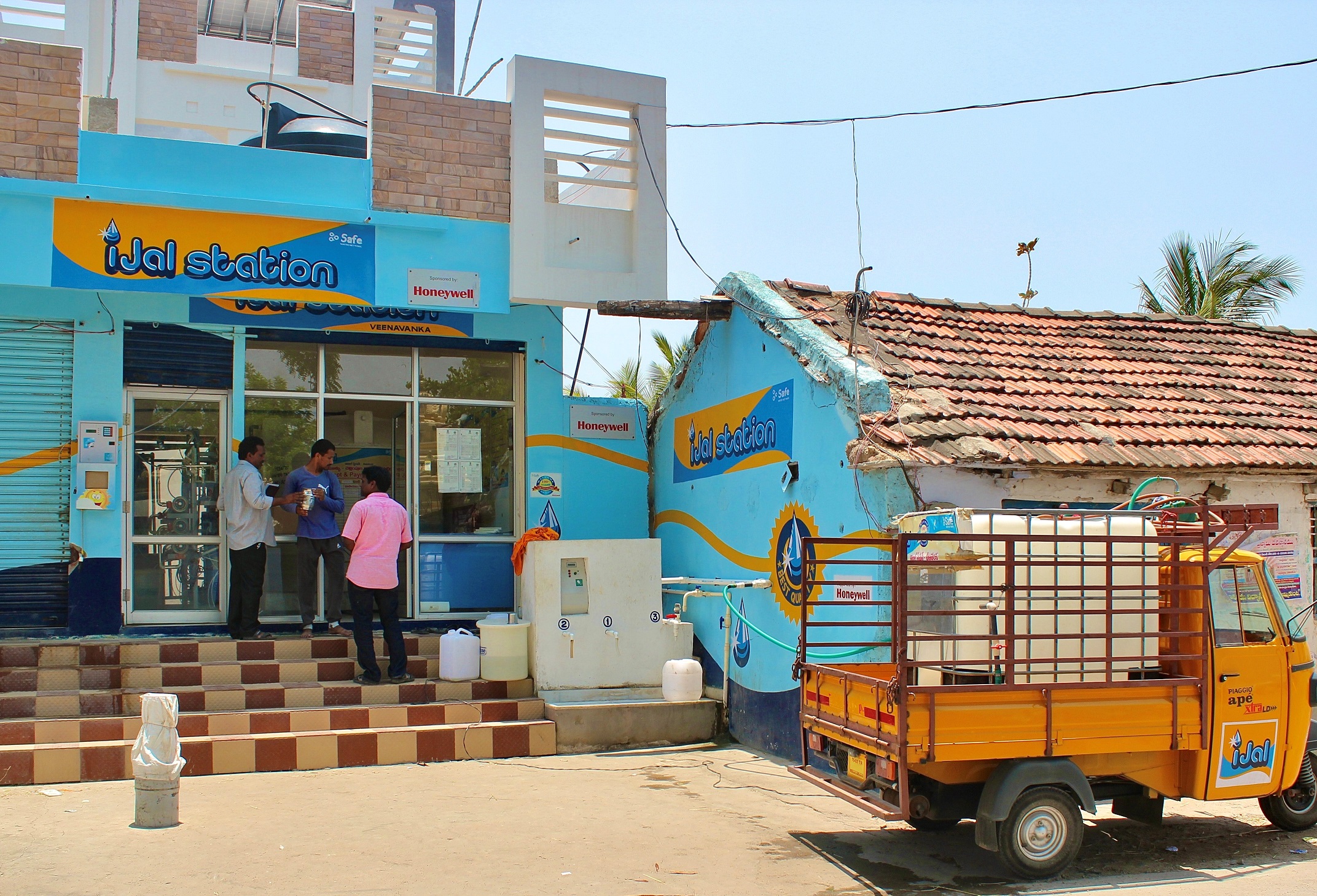
Understanding the drivers and key risks for the private sector is of critical importance in their engagement in owning, operating, and managing safe water supply through small water enterprises. A virtual roundtable on ‘Private sector engagement for scale-up of small water enterprises’ was held on June 19, 2020, under the aegis of Project SEWAH–Sustainable Enterprises for Water and Health, a joint initiative of Safe Water Network India and USAID. The discussion helped generate ideas to attract private sector investment for small water enterprises in the country as complementary safe drinking water solution to piped water and thus contribute towards the UN’s Sustainable Development Goal 6.
The event had participation from all three levels of government – centre, state, and urban local bodies, which deliberated on the opportunities and challenges for the small water enterprises from a government perspective. The other key speakers were safe water implementers, corporates that promote small water enterprises through their corporate social responsibility (CSR) initiatives, technology providers, and international development agencies.
Small water enterprises are recognised as cost-effective and customizable drinking water solutions that can synergize a major thrust in the safe drinking water provision specifically at places where the flagship government schemes such as the Jal Jeevan Mission cannot reach and are yet to reach. The participants discussed how public-private partnerships can play a major role in providing safe drinking water to water-stressed or quality-affected communities.
The small water enterprises have been set up as public-private partnerships, using a mix of funding that heavily leaned on the 2 percent corporate CSR grants. However, with declining CSR funds, as most of it is going towards Covid-19 care, it has become imperative for the small water enterprises to explore new investment avenues.
“There is a potential role of small water enterprises, in running and maintaining units developed under schemes like Jal Jeevan Mission, or by tying up with Skill Development Centers (SDCs) for capacity-building programs,” says Devender Singh, IAS, and Additional Chief Secretary, Public Health and Engineering Department (PHED) Haryana. Delivering the keynote address for the session, he laid the state government’s water delivery approach that has a primary focus on Jal Jeevan Mission.
“Haryana has a water ATM policy where financial sustainability is built-in through revenue from water sales and advertising through billboards. The water ATMs are promoted in cities and towns for the mobile customer and also for the people in low-income colonies. Although the towns are small, in aggregate they account for a substantial proportion of the overall urban population,” says Singh.
“There are multiple areas where private enterprises can make themselves useful to the government. Treatment of water, reuse of water, or end-to-end automation provides a good opportunity for public-private partnerships. It has an impact on water quality, the health of the city, and availability of potable and non-potable water for usage across different purposes,” says Tukaram Mundhe, IAS, Municipal Commissioner Nagpur Municipal Corporation.
Delivering the special guest address in the session, Mundhe elaborated on how Nagpur is demonstrating a successful public-private partnership in piped water, where the services are privatized and the water rights remain with the government. “The biggest problem is metering and collecting user charges from the consumer. The consumers are unwilling to pay meagre monthly charges of Rs. 50-70,” says Mundhe.
Small water enterprises in times of Covid
Due to the diminishing CSR funds and falling revenue generation from user fees at the water ATMs during the Covid-19 pandemic, the small water enterprises cannot rely upon the earlier models of operations. Financial sustainability has become the most important determinant for the survival and scale-up of small water enterprises as water is priced within certain socio-economic parameters to reach all. This lack of opportunities for the small water enterprises to generate operating revenues let alone make a marginal profit from the water sales also keeps the private investors at bay.
 “A small water enterprise model should have a self-sustaining feature factored in so that it continues to operate sustainably and there is a lower dependency on perennial funding from the private sector,” says Jhalak Jain, Sr. Manager-CSR, Honeywell Hometown Solutions, which has invested deeply in small water enterprises for public health and social development through their CSR.
“A small water enterprise model should have a self-sustaining feature factored in so that it continues to operate sustainably and there is a lower dependency on perennial funding from the private sector,” says Jhalak Jain, Sr. Manager-CSR, Honeywell Hometown Solutions, which has invested deeply in small water enterprises for public health and social development through their CSR.
“The AMRUT Mission of Ministry of Housing and Urban Affairs seeks increased participation of private sector organisations in the overall implementation of water supply projects. While AMRUT will help in increasing the coverage of water supply to 100 percent in 500 AMRUT cities, water supply coverage in smaller towns needs attention. The private small water enterprise players can be involved in projects with capital investment and management of water supply system to bring in operational efficiency,” says Suneet Mehta, IFS, Deputy Secretary IC & AMRUT, Ministry of Housing and Urban Affairs.
Small water enterprises provide a window of investment to the private sector, but this option has its own set of challenges. The stakes for the private sector to invest in the small water enterprises remain very high. “India has been selected as one of the 18 high priority countries for water by USAID Washington which means that there will be a greater focus for USAID to work in water-related issues in India. SEWAH Project opens doors for greater collaboration with small water enterprises implementers to work in unison to provide safe drinking water solutions to urban communities in India,” says Anand Rudra, Senior Advisor-WASH, USAID India, while co-hosting the session. USAID has been providing platforms and resources to voice the concerns of the sector to the relevant authorities for scale-up.
“There is a huge need in the country for safe drinking water and the private sector is keen to participate. It can be done through collaboration and an enabling environment. The government should not consider the international organizations as external parties but should look towards working with us in an integrated manner where we can bring our technology and best practices to make a difference at a local level,” says Maya Acharya, Senior Policy Advisor, Embassy of Netherlands which collaborates with the centre on infrastructure projects.
“Water is a critical service. Small water enterprises should be recognized as a support to the government. It will save lives and contribute to the economy by creating jobs, self-employment opportunities, vocational training, and skill development,” says Dr. Parag Agarwal, Founder & CEO, Janajal, a dedicated small water services company that has benefited over 20 million people.
He added that the private sector brings speed, talent, and efficiencies to the program and that the government should consider them as partners and provide an enabling environment to perform and recover costs.
“There is a huge gap in the market in terms of technology selection, fund rotation, and implementation. We need to bridge this gap together, bring in transparency into decision-making with the government and explore for partnerships,” says Dennis Abraham, Managing Director, Josab Water Solutions, a technology solution as well as implementing organization.
The challenges faced by the private sector range from working through delayed infrastructure delivery, complex institutional frameworks with multiple regulatory authorities, politicians offering free water, leading to lower probabilities of recovering the capital investments, or even the operating costs.
Experience suggests that unless major reforms are made at both policy and implementation levels, the path to successful private investments in the small water enterprises sector will not be smooth. There is an increasing need for holistic collaboration with the government in terms of technological, monetary, and resource sharing partnerships. Despite the risks and the challenges, there is a clear potential for private sector investment in the small water enterprises.
Highlighting the need for forming a national water ATM policy and a regulatory framework that governs the small water enterprises sector, Poonam Sewak of Safe Water Network India said that the government needs to ease the stringent regulations on water treatment units, promote MSME and adopt more business-friendly policies.
She also stressed on the need to adopt suitable water tariffs, undertake capacity building and expertise in the drinking water sector. “There is a need to simplify the institutional framework and create opportunities for public-private partnerships in the drinking water sector, and provide viability gap funding,” she says.
/articles/private-sector-engagement-scaling-small-water-enterprises